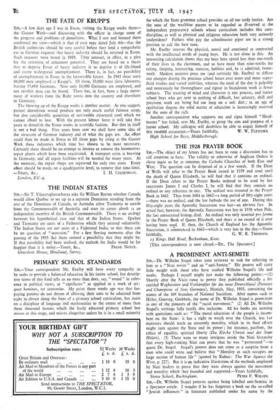THE FATE OF KRUPP'S
Stit,—A few days ago I was in Essen, visiting the Krupp works there— the Gustav Werk—and discussing with the officer in charge some of the progress and problems of demolition. What I saw and learned there confirmed my view—which is that of your nose dated July 4th—that the British authorities should be very careful before they lend a sympathetic ear to German requests that heavy industry should be retained in Essen. Such reauests were heard in 1919. They amount, in effect, to a plea for the retention of armament potential. They are based on a thesis that to deprive Essen of heavy industry is to deprive it of life-blood and create widespread unemployment. There is, in fact, no possibility of unemployment in Essen in the foreseeable future. In 1943 there were 86,000 men employed rt Krupp's. Of these, 33,000 were slave labourers, leaving 53,000 Germans. Now only 16,000 Germans are employed, and not another man can be found. There has, in fact, been a large move- ment of workers from the Ruhr towns into the country and elsewhere in Germany.
The blowing up of the Krupp works is another matter. As you suggest, patient demolition would produce not only much useful furnace scrap, but also considerable quantities of serviceable structural steel which we cannot afford to lose. With the present labour force it will take five years to demolish the Essen works in scientific fashion. But that in itself is not a bad thing. Five years from now we shall have some idea of the structure of German industry and of what the gaps are. An effort could then be made in Essen to fill those gaps by siting at the Gustav Werk those industries which time has shown to be most necessary. Certainly there should be no attempt to destroy or remove the locomotive- repair plants which have been reactivated. A transport crisis is brewing in Germany, and all repair facilities will be needed for many years. At the moment, the repair shops are reprieved for only two years. Every effort should be made, on a quadripartite level, to remove that time-limit.
—Yours, &c., I. H. COLQUHOUN. Lonc:on, E.G. 4.


































 Previous page
Previous page